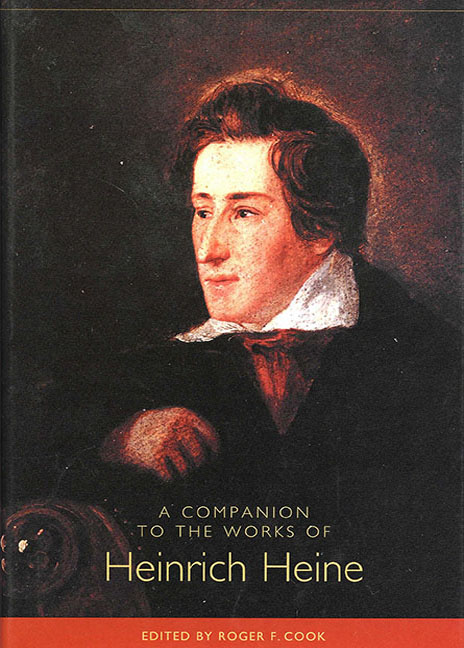Book contents
- Frontmatter
- Contents
- Acknowledgments
- Chronology of Heine's Life
- Heine's Major Works
- List of Abbreviations
- Introduction
- The Romantic Poet
- Philosophy, History, Mythology
- Nightingales Instead of Owls: Heine's Joyous Philosophy
- Eternal Return or Indiscernible Progress? Heine's Conception of History after 1848
- Heinrich Heine and the Discourse of Mythology
- Religion, Assimilation, and Jewish Culture
- Modernity: Views from the Poet's Crypt
- Reception in Germany
- Notes on the Contributors
- Index
Nightingales Instead of Owls: Heine's Joyous Philosophy
from Philosophy, History, Mythology
Published online by Cambridge University Press: 29 July 2017
- Frontmatter
- Contents
- Acknowledgments
- Chronology of Heine's Life
- Heine's Major Works
- List of Abbreviations
- Introduction
- The Romantic Poet
- Philosophy, History, Mythology
- Nightingales Instead of Owls: Heine's Joyous Philosophy
- Eternal Return or Indiscernible Progress? Heine's Conception of History after 1848
- Heinrich Heine and the Discourse of Mythology
- Religion, Assimilation, and Jewish Culture
- Modernity: Views from the Poet's Crypt
- Reception in Germany
- Notes on the Contributors
- Index
Summary
Whether it has been the result of the unquestioned hold of convention or the consequence of the division of labor between the academic disciplines dictated by the institutional organization of research, Heine's prose and poetry are still widely viewed as two distinctly different literary projects. But the separation of the aesthetic from the political significance of his work has limited the comprehension of the critical scope of Heine's writing. Almost exclusive focus on the aesthetic and political implications has led many critics to the assumption that there are two neatly disjunctive spheres, which, in turn, can be equally neatly integrated into one unproblematic, whole Heine. However, Heine challenges precisely such dichotomy. Whereas much of Heine criticism argues as if the aesthetic and political presented two separate, but complementary halves, Heine's work seems, on the contrary, to call for readings more attuned to the problem of their intricate interdependence. Gesturing to a principal questioning of the conceptual grasp of distinctions such as the one between the aesthetic and the political, his writing alerts to the need to reach beyond the constraints of conventional poetics and, instead, to critically refashion and rewrite the author as publicist; as an author whose poetics reflects the problem of tackling the precarious border between reason and imagination that separates but also conjoins thought and the creative forces of the subconscious, the two crucial agents of philosophy and literature. However, the divided reception of Heine as the lyrical genius who would inspire the musical imagination of scores of Romantic composers and even make a Metternich shed a tear, on the one hand, and as an invidious “shadow image of the German intellectual” and provocative scare of the bourgeoisie, as Habermas so succinctly put it (96), on the other hand, has produced a deeply split image of the poet. As a consequence, the philosophically critical impulse at the heart of Heine's work has been lost on most readers. Certainly, Heine's comments on philosophy and intellectual history have received, if not necessarily their deserved theoretical attention, at least praise for their spirited eloquence. But his writing on religion has also presented some hermeneutic challenges. Yet, the recognition of the importance of philosophy in Heine has remained limited to sporadic acknowledgments of the passages in which he addresses philosophy in explicit terms.
- Type
- Chapter
- Information
- A Companion to the Works of Heinrich Heine , pp. 139 - 168Publisher: Boydell & BrewerPrint publication year: 2002



